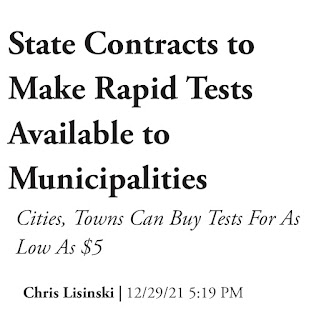Welcome to the FY23 budget discussion!
It's supposed to broadcast here, but it isn't...
Okay, we're in and late...FY22 numbers, that I'm going to pick up later from people who get this stuff in writing
Geoffrey Snyder, Commissioner, Mass Department of Revenue:
forecasting revenue for FY23 to be between $36.484B to $37.684B
That is 2.1% and 2.9% higher than FY22 range
Now we're getting the subsets of where the money is from...
uncertainty about sustainability of trends going forward
significant degree of uncertainty in these forecasts
Rep. Michlewitz: any impact on this from omicron so far?
Snyder: not specifically so far
Sen. Rodrigues introduces Mass Taxpayers' Foundation
"how difficult it has been" to project revenue
like a roller-coaster ride "and I think we have one more loop"
"startling" 15% growth in tax revenue
"in large part" due to federal relief
projecting reverting to slow growth for next year
1.1% in growth for FY23, or revenue of $37.6B
capital gains slowing, they project
sale tax revenue at only 1%; spending on durable goods shifting back to services
inflation rates to slowly decline over the next 18 months
"labor force issues" taking a firmer hold
pandemic has accelerated retirement among baby boomers
MA may be able to offset with "higher productivity per worker"
"highly educated workers tend to be more productive"
(this isn't going to help us with bus drivers)
Access to talent moves to forefront
workforce screening and skill development needed from state
outside factors that impact the forecast: global pandemic and geopolitical risks
stronger and more destructive storms due to climate change
Russia, China, Middle East
Cyber threats
Divisive political climate
failure to pass Build Back Better could slow economic recovery, per Moody's
Alan Clayton-Matthews, Northeastern University
"I have a different outlook"
FY22 $38.301B (12.2% above FY21)
FY23 $40.795B (6.5% over FY22)
federal stimulus has largely achieved its objective of buffering the economy
inflation will be subsiding
corporate profits will continue
assumes strong stock market has and will continue to spur a surge in capital grains
effect of unemployment insurance programs on tax revenues is waning
MA gross state product has been growing in step with U.S. GDP for past several decades, as well as past several years specifically
by 4th Q of FY23, employment is expected to achieve the pre-pandemic peak
after that, difficult to grow further without migration into the state
core inflation expected to wane (doesn't include fuel and food): FY22 3.8% FY23 2.3%
"capital gains realizations are much more predictable than stock prices in the model I use"
"fairly reliable predictions"
(I am going to add photos of the charts in here)

Rodrigues: does this include any consideration of the Build Back Better?
Only extension of the child tax credit "so essentially no"
Michael Goodman, UMass Dartmouth
supply chains, labor supply, and continuing pandemic creating headwinds for economic recovery
third quarter recovery, continuing into fourth quarter, slowing next year
labor market recovery has been constrained, well below our pre-recession employment peak
job market and underlying economy have been pretty strong despite these headwinds
"significant wage growth"
particularly at lower end, and even representing real wage growth, in excess of inflation
people still not returning to labor market, though
"a number of good reasons" for that (chart to put in here)
Federal Reserve Bank of Atlanta: workers have other options, switching positions
aging of workforce also helps explain our current labor supply woes
high quality childcare very expensive; retirees caring for grandchildren?
all of these things reduce the size of the labor force
prices have been rising rapidly but supply constraints are a big part of the story
energy prices have been driving this, as well as things like new and used cars
"kinks in global supply chain are weighing heavily in our economic outlook"
national survey of CFO's suggest supply chain disruptions are likely to persist for some time
broad and uneven distribution of vaccines tied to economic trajectories: by county, higher vaccination, higher consumer spending, lower unemployment
surge in hospital admissions, but overwhelmingly those who are not vaccinated
do have hospital capacity issues, nonetheless
vaccinations "are not a force field of vulnerability"
six to eight weeks, suspect we'll see an uptick in cases
extending vaccinations and making it easier for venues to make it easier to see who is vaccinated and not so as to ride out the disruptions while having the highest levels of public health
"wind up with a little bit of humility"
chair of Federal Reserve saying that none of us knows where the economy will be in a year or more
inflation, labor supply, supply chain issues
Treasurer Deb Goldberg
long-term all weather portfolio will continue to perform well
Commonwealth's "robust economic base and its prudent fiscal management practices"
Evan Horowitz, Center for State Policy at Tufts
FY23 $36.5B
unappreciated risks and weaknesses of current situation
"many ways for our economy to stumble" and fewer ways for corrections
more stable revenue streams are only slightly above state benchmarks
high corporate taxes and prepayment
little jump at end of state revenue as a share of GDP
two paths possible, either fall dramatically or have a more gradual curve down
FY23 more likely to see a reversion in corporate taxes and prepayments
not particularly concerned about runaway inflation or stagflation
"inflation is much higher right now than anticipated"
each of the (more) dollars collected is less valuable
cost of running state government is higher (AND LOCAL AS WELL)
"makes revenue projections less cheering"
once you account for inflation, projection is actually a decline
Hearing closed



















